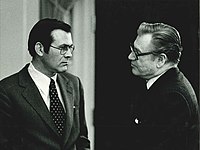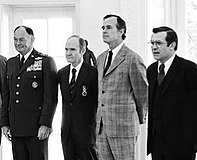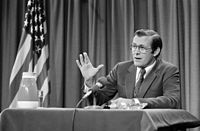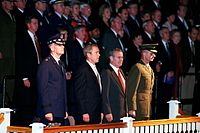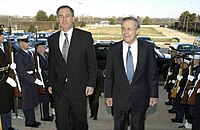
Donald Rumsfeld
Donald Henry Rumsfeld (July 9, 1932 – June 29, 2021) was an American politician, government official and businessman who served as Secretary of Defense from 1975 to 1977 under president Gerald Ford, and again from 2001 to 2006 under President George W. Bush.[1][2] He was both the youngest and the oldest secretary of defense.[3] Additionally, Rumsfeld was a four-term U.S. Congressman from Illinois (1963–1969), director of the Office of Economic Opportunity (1969–1970), counselor to the president (1969–1973), the U.S. Representative to NATO (1973–1974), and the White House Chief of Staff (1974–1975). Between his terms as secretary of defense, he served as the CEO and chairman of several companies.
"Rumsfeld" redirects here. For the professor, see John S. Rumsfeld.
Donald Rumsfeld
Gerald Ford
- Richard Nixon
- Gerald Ford
Richard Nixon
Position established
Position abolished
Richard Nixon
Robert Finch
Richard Nixon
Bertrand Harding
July 9, 1932
Chicago, Illinois, U.S.
June 29, 2021 (aged 88)
Taos, New Mexico, U.S.
3
"Rummy"
- 1954–1957 (active)
- 1957–1975 (Reserve)
- 1975–1989 (Ready Reserve)
Born in Illinois, Rumsfeld attended Princeton University, graduating in 1954 with a degree in political science. After serving in the Navy for three years, he mounted a campaign for Congress in Illinois's 13th Congressional District, winning in 1962 at the age of 30. Rumsfeld accepted an appointment by President Richard Nixon to head the Office of Economic Opportunity in 1969; appointed counsellor by Nixon and entitled to Cabinet-level status, he also headed up the Economic Stabilization Program before being appointed ambassador to NATO. Called back to Washington in August 1974, Rumsfeld was appointed chief of staff by President Ford. Rumsfeld recruited a young one-time staffer of his, Dick Cheney, to succeed him when Ford nominated him to be Secretary of Defense in 1975. When Ford lost the 1976 election, Rumsfeld returned to private business and financial life, and was named president and CEO of the pharmaceutical corporation G. D. Searle & Company. He was later named CEO of General Instrument from 1990 to 1993 and chairman of Gilead Sciences from 1997 to 2001.
Rumsfeld was appointed Secretary of Defense for a second time in January 2001 by President George W. Bush. As Secretary of Defense, Rumsfeld played a central role in the 2001 United States invasion of Afghanistan and 2003 invasion of Iraq. Before and during the Iraq War, he claimed that Iraq had an active weapons of mass destruction program; no stockpiles were ever found.[4][5] A Pentagon Inspector General report found that Rumsfeld's top policy aide "developed, produced, and then disseminated alternative intelligence assessments on the Iraq and al-Qaeda relationship, which included some conclusions that were inconsistent with the consensus of the Intelligence Community, to senior decision-makers".[6] Rumsfeld's tenure was controversial for its use of torture and the Abu Ghraib torture and prisoner abuse scandal.[7] Rumsfeld gradually lost political support and resigned in late 2006. In his retirement years, he published an autobiography, Known and Unknown: A Memoir, as well as Rumsfeld's Rules: Leadership Lessons in Business, Politics, War, and Life.
Return to the private sector (1977–2000)[edit]
Business career[edit]
In early 1977 Rumsfeld briefly lectured at Princeton's Woodrow Wilson School and Northwestern's Kellogg School of Management. His sights instead turned to business, and from 1977 to 1985 Rumsfeld served as chief executive officer, president, and then chairman of G. D. Searle & Company, a worldwide pharmaceutical company based in Skokie, Illinois. During his tenure at Searle, Rumsfeld led the company's financial turnaround, thereby earning awards as the Outstanding Chief Executive Officer in the Pharmaceutical Industry from the Wall Street Transcript (1980) and Financial World (1981). Journalist Andrew Cockburn of Harper's Magazine claimed that Rumsfeld suppressed news that Searle's key product, aspartame, was shown to have potentially dangerous effects by leveraging old government contacts at the Food and Drug Administration.[60] In 1985, Searle was sold to the Monsanto Company.[61]
Rumsfeld served as chairman and chief executive officer of General Instrument from 1990 to 1993.[62] A leader in broadband transmission, distribution, and access control technologies for cable, satellite, and terrestrial broadcasting applications, the company pioneered the development of the first all-digital high-definition television (HDTV) technology. After taking the company public and returning it to profitability, Rumsfeld returned to private business in late 1993.[63]
From January 1997 until being sworn in as the 21st Secretary of Defense in January 2001, Rumsfeld served as chairman of Gilead Sciences, Inc. Gilead is the developer of Tamiflu (Oseltamivir), which is used in the treatment of bird flu[64] as well as influenza A and influenza B in humans.[65] As a result, Rumsfeld's holdings in the company grew significantly when avian flu became a subject of popular anxiety during his later term as Secretary of Defense. Following standard practice, Rumsfeld recused himself from any decisions involving Gilead, and he directed the Pentagon's general counsel to issue instructions outlining what he could and could not be involved in if there were an avian flu pandemic and the Pentagon had to respond.[66][67]
Death[edit]
On June 29, 2021, Rumsfeld died from multiple myeloma at his home in Taos, New Mexico.[183][184] He was buried in Arlington National Cemetery on August 24, 2021.[185][186]
Rumsfeld was awarded 11 honorary degrees.[188] Following his years as CEO, president, and later chairman of G. D. Searle & Company, he was recognized as Outstanding CEO in the pharmaceutical industry by The Wall Street Transcript (1980) and Financial World (1981).[189]
Some of his other awards included:
Legacy and reputation[edit]
Secretary of State Henry Kissinger described Rumsfeld as "the most ruthless man" he knew.[201] George Packer of The Atlantic named Rumsfeld "the worst secretary of defense in American history" who "lacked the wisdom to change his mind.”[202] Bradley Graham, a Washington Post reporter and author of the book titled By His Own Rules: The Ambitions, Successes, and Ultimate Failures of Donald Rumsfeld released on June 23, 2009, stated "Rumsfeld left office as one of the most controversial Defense Secretaries since Robert McNamara and widely criticized for his management of the Iraq war and for his difficult relationships with Congress, administration colleagues, and military officers.”[203] Neoconservative commentator Bill Kristol was also critical of Rumsfeld, stating he "breezily dodged responsibility" for planning mistakes made in the Iraq War, including insufficient troop levels.[204]
Works
Government service
Documentary videos
Articles profiling Rumsfeld


